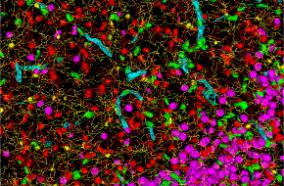The pituitary gland is located at the base of the brain and is involved in the secretion of several hormones. Tumors arising from the pituitary gland are called adenomas – "adeno" means gland and "oma" means tumor. Adenomas are benign and slow growing. These tumors are classified as "secreting" tumors or "non-secreting." The majority are secreting tumors and are classified further by the hormone(s) being secreted. Hormonally active tumors cause endocrine system problems by releasing excess hormones into your bloodstream. Several blood tests can determine which hormones are elevated or reduced after which an MRI scan is used to determine tumor size and position in relation to other brain structures.
Symptoms vary based on the type of your tumor and its location, but can include the following:
-
Headaches
-
Changes in vision
-
Diabetes
-
High blood pressure
-
Joint pain
-
Fatigue/lack of energy
-
Growth of the hands and feet
-
Disruption of the menstrual cycle
-
Decreased libido or erections
-
Infertility
-
Milk production from the breast
Prolactinoma - These tumors cause over-production of prolactin. In women it may cause inappropriate production of breast milk, or it may cause menstruation to stop. In men, it may cause decreased sex drive and impotence.
ACTH Producing Adenomas - ACTH stimulates the adrenal gland to make and secrete natural steroids. Excess glucorticosteroids (natural steroids) cause Cushing’s disease. Symptoms include moon-shaped face, excess hair growth, easy bruising, high blood pressure, and menstrual irregularities.
Growth Hormone Producing Adenomas - These tumors may cause gigantism in children and adolescents. In adults, the hands, feet and lower jaw become enlarged.
Other Hyper-secreting Pituitary Tumors - They include tumors which secrete excess thyrotropin (thyroid stimulating hormone), follicle stimulating/luteinizing hormone (controls ovaries and testes), and alpha subunit (a glyco-protein hormone).
Non-secreting Tumors - These tumors grow slowly. If they expand enough, they may press on the optic nerves causing vision disorders and headaches. If the tumors compress the pituitary gland itself, so that it cannot produce and deliver normal hormones, hypopituitarism develops. Hypopituitarism can have symptoms such as weakness, fatigue, loss of sexual function, light-headedness, and apathy.
The vast majority of pituitary tumors have no identifiable cause. Some, however, can occur as part of a genetic disorder such as multiple endocrine neoplasias or McCune-Albright syndrome. Researchers at the UW Medicine Neurosciences Institute are currently studying the genetic causes of various pituitary tumors.
Having a genetic disorder — such as multiple endocrine neoplasias or McCune-Albright syndrome — which predisposes you to having tumors.
If your doctor suspects you might have a pituitary tumor, you will most likely have an MRI, which is the best way to diagnose these tumors.
-
Bloodwork can also help identify a secretory tumor if it doesn’t show up on the MRI.
-
A test called inferior petrosal sinus sampling (IPSS) may also be useful in locating small tumors that don’t appear on imaging.
Complications can include the following:
-
Loss of vision
-
Double vision
-
Loss of pituitary function
-
Numbness or pain in the face
In addition, if you have Cushing’s disease or acromegaly and do not receive treatment, your life expectancy will be decreased.




















